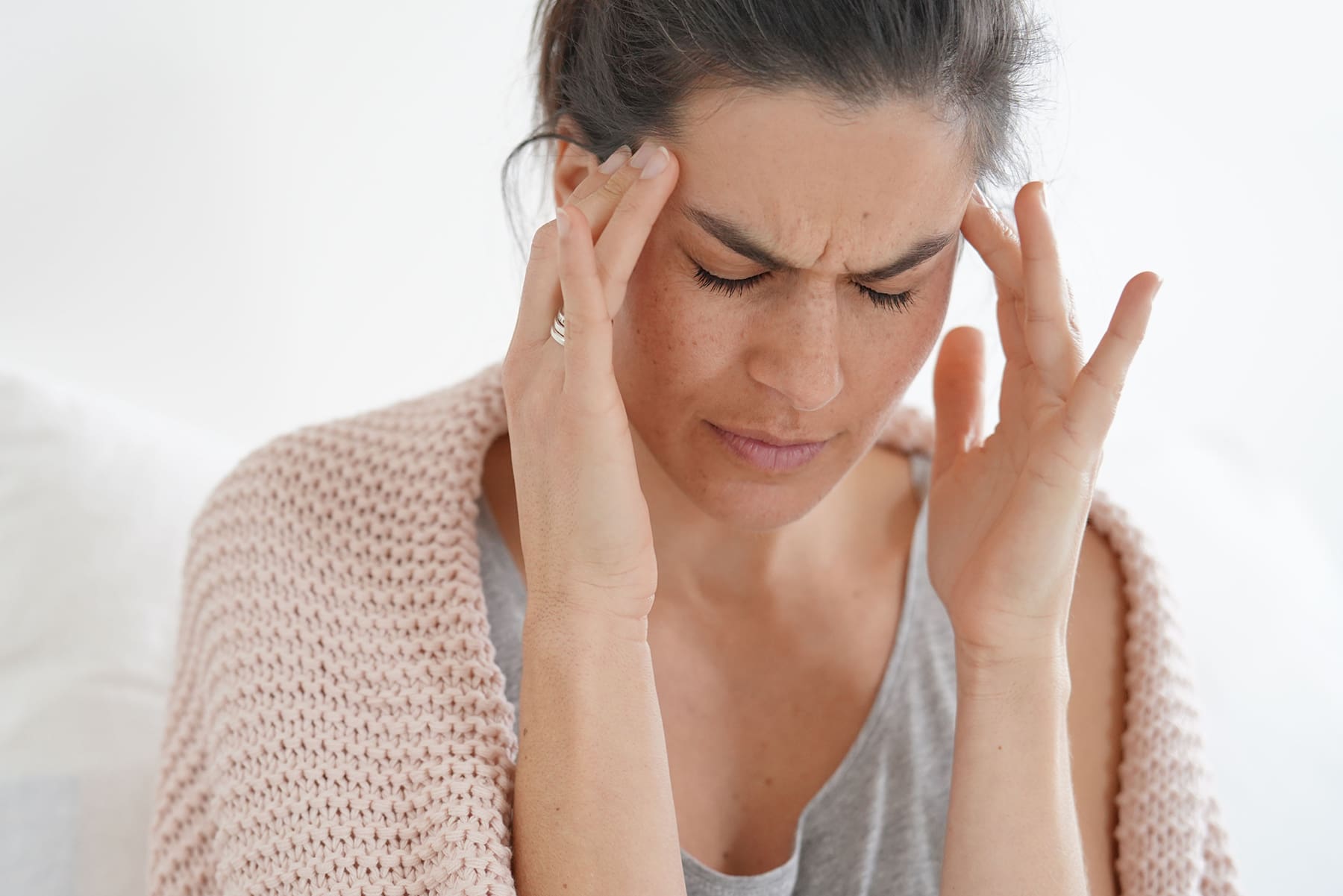Reviewed By Blake Gilliam, CRNP
Reading Time: 4 minutes
Have headaches become your new normal?
If you rarely dealt with them in the past but now feel like they have taken over your life, perimenopause might be the reason.
Hormonal fluctuations during this time can trigger headaches, migraines, and other menopausal symptoms that catch many women off guard.
In this blog, we will explore the connection between hormonal changes in perimenopause and headaches, identify potential triggers, and provide practical tips for finding relief.
Table of Contents
Key Takeaway
Hormonal changes during perimenopause often cause more frequent and intense headaches. You can reduce these headaches by identifying triggers, making lifestyle changes, and trying hormone therapy.
Hormonal Changes in Perimenopause and Headaches
Perimenopause marks the transitional phase leading up to menopause, typically beginning in a woman’s late 30s or early 40s.
During this period of time, your body undergoes significant hormonal fluctuations, particularly with estrogen and progesterone levels. A drop in estrogen levels can have a direct impact on the frequency of headaches you are experiencing.
Additional symptoms associated with perimenopause, such as night sweats and disturbed sleep, can exacerbate headache symptoms and make them more frequent.
Types of Headaches in Perimenopause
Migraine Headaches
If migraines were a normal occurrence for you before perimenopause, you may notice a change in frequency and intensity.
Some experience more frequent migraine headaches or migraine symptoms such as sensitivity to light, visual disturbances, or neck stiffness. These migraine triggers are often linked to fluctuations in estrogen levels and progesterone levels.
Tension Headaches
Tension headaches are another common type of headache during perimenopause.
Characterized by dull headache pain and tightness around the head, tension headaches can be triggered by stress, muscle tension, or disturbed sleep patterns.
Menstrual Migraines
Perimenopausal women who have a history of migraine may find that menstrual migraines worsen as hormone levels fluctuate.
The drop in estrogen around the menstrual period can serve as a significant trigger for migraine in this time period.
Potential Triggers for Hormonal Headaches
Hormone-related headaches are common during perimenopause, but other factors can exacerbate headache pain.
Some common triggers include:
- Stress: Hormonal headaches can worsen during periods of high stress. Stress management techniques, such as yoga, meditation, or behavioral therapies, can be effective for reducing the frequency of headaches.
- Lack of sleep: Sleep disturbances are common during perimenopause. Sleep disorders or inconsistent sleep patterns can act as a trigger for migraine and tension headaches.
- Dietary factors: Certain foods like aged cheeses, alcohol, and caffeine may serve as a trigger for migraine attacks or tension headaches. Maintain a headache diary to pinpoint dietary triggers.
Effective Treatment and Tips for Daily Habits
Hormonal headaches often require a combination of preventive treatment, acute treatments, and lifestyle changes.
- Maintain a healthy lifestyle: Engage in regular exercise to support overall well-being. Exercise options such as walking, swimming, or yoga can also reduce muscle tension and improve sleep quality. Prioritize a balanced diet to minimize migraine triggers.
- Track your headaches: Use a headache diary to monitor the frequency of headaches and potential triggers. This can provide valuable insight into patterns and assist your healthcare provider in tailoring treatments.
- Consider hormone therapy: Menopausal hormone therapy, such as bio-identical hormone replacement therapy (BHRT), may help stabilize hormone levels and alleviate severe migraines. A healthcare professional can guide you on the best treatment options for hormonal fluctuations.
- Stress reduction techniques: Incorporate activities like mindfulness meditation or journaling to manage stress, which can significantly impact the frequency of migraines during menopause.
- Acute and preventive treatments: Over-the-counter pain relievers or prescribed treatments for migraine may help manage severe headaches. Preventive treatment strategies like behavioral therapy can also address underlying triggers.
When to Seek Medical Advice
If you experience severe headaches, frequent headaches, or migraine symptoms that interfere with your everyday activities, it may be time to consult a headache specialist or healthcare provider.
A professional evaluation can rule out serious conditions and recommend treatments tailored to your needs, such as hormone therapy or behavioral therapies.
Book an Appointment to Learn More About BHRT for Women
Are hormonal fluctuations impacting your quality of life?
Hormone replacement therapy, such as BHRT, could help you manage your symptoms, including menopause-related headaches.
At our wellness clinic in Madison, AL, we offer personalized hormone therapy treatments for women.Schedule an appointment with Blake Gilliam, CRNP, by calling (256) 325-0955 or complete the online booking form. Our wellness clinic is located at 1230 Slaughter Rd Suite C, Madison, AL.

